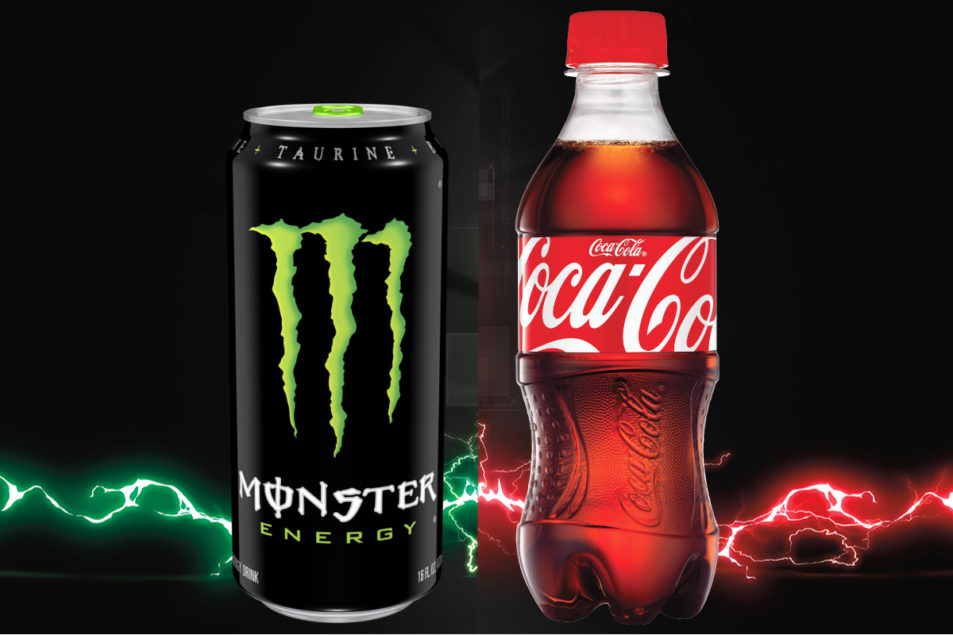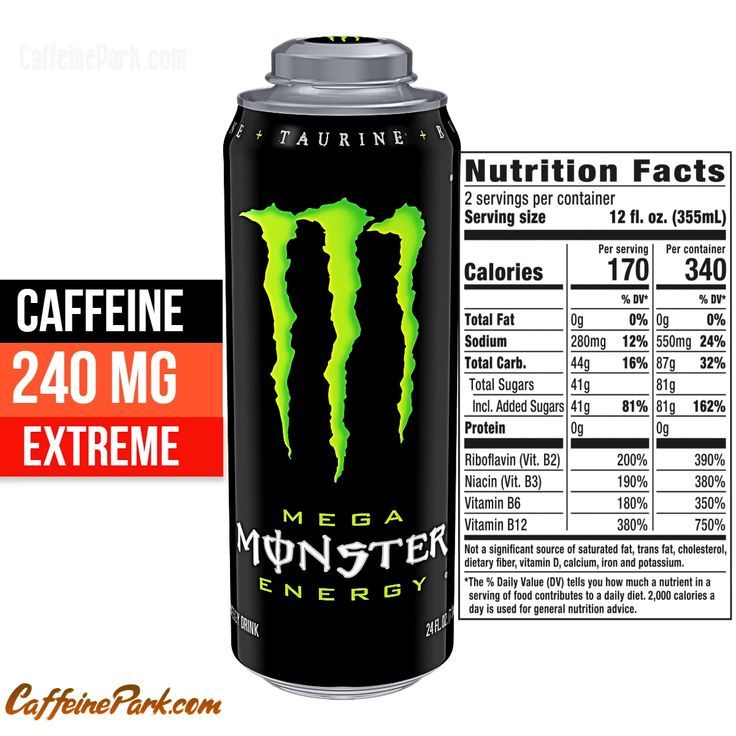Monster Energy drinks have become increasingly popular among young adults due to their branding and marketing strategies.
However, the branding and marketing techniques do not always align with the actual caffeine content of the drink. It is important to understand the caffeine content in Monster Energy drinks to make informed decisions about their consumption.
What is Monster Energy drink?
Monster Energy drink is a popular energy drink that comes in various flavors and types. The drink contains caffeine, taurine, B vitamins, and other ingredients that claim to provide an energy boost. Monster Energy is marketed towards people who need energy to stay awake and alert for long periods such as students, athletes, and shift workers.
Importance of knowing the caffeine content in Monster Energy drink
Knowing the caffeine content in Monster Energy drinks is crucial since caffeine has both positive and negative effects on the body. In small amounts, caffeine can improve mood, increase alertness and concentration, and enhance athletic performance. However, excessive amounts of caffeine can cause negative effects such as jitteriness, anxiety, and insomnia.
Moreover, various factors such as age, body weight, and tolerance levels can influence how individuals respond to caffeine. Therefore, understanding the caffeine content in Monster Energy drinks can help individuals make informed decisions about how much of the drink to consume and when to consume it.
In comparison to coffee, Monster Energy drinks contain less caffeine. A standard 8 oz cup of coffee typically has around 95 mg of caffeine while a 16 oz can of Monster Energy drink contains 160 mg of caffeine. However, it is important to note that caffeine content varies across different types and brands of coffee and Monster Energy drinks.
In conclusion, understanding the caffeine content in Monster Energy drinks is crucial since excessive consumption can lead to negative effects on the body. It is important to make informed decisions about the amount and timing of Monster Energy drink consumption, keeping in mind individual factors such as tolerance levels, age, and body weight.
Caffeine Content in Monster Energy Drink
How much caffeine is in a 16 oz Monster Energy drink?
The original Monster Energy drink, which is the one that started it all for the company, contains 160 mg of caffeine per 16 oz can, which translates to 10 mg of caffeine per fluid ounce. This puts Monster in the upper half of caffeine content per full can.
Caffeine levels in Monster Zero and other Monster Energy drinks
Monster Energy Zero is a popular beverage choice for those who want the energy boost without the added sugar. Monster Zero contains 140 mg of caffeine per can, which is only slightly less than the original version of the drink while having zero sugar.
Other Monster Energy drinks such as Ultra and Java also contain caffeine, with Ultra having 140 mg of caffeine per can and Java having 188 mg of caffeine per 15 oz can.
Compared to other caffeinated beverages, Monster’s caffeine content is higher than Red Bull, which has 80 mg of caffeine per 8.4 oz can, and Coca-Cola, which has 34 mg of caffeine per 12 oz can. However, Monster’s caffeine content falls within the range of a standard 12 oz cup of coffee, which typically contains around 90-120 mg of caffeine.
It’s important to note that consuming too much caffeine can have adverse effects on the body, such as jitters, anxiety, and difficulty sleeping. It is recommended that caffeine consumption be limited to 400 mg per day, with each can of Monster Energy drink containing close to half of that amount.
In conclusion, Monster Energy drinks are known for their high caffeine content, with the original drink containing 160 mg of caffeine per can. Other versions of the drink, such as Monster Zero, may have slightly less caffeine but still provide a significant energy boost. It’s important to consume any caffeinated beverage in moderation to avoid potential negative side effects.
Comparing Monster Energy Drink with Other Caffeinated Beverages
Monster Energy vs. Red Bull
Red Bull and Monster Energy drinks are two of the most popular energy drinks available in the market. While both of them have caffeine as their primary ingredient, their caffeine content levels differ. Monster Energy has a caffeine content of 160 mg per 16 oz, whereas Red Bull has 80 mg of caffeine per 8.4 oz can.
Monster Energy also contains some additional energy-boosting ingredients such as taurine and ginseng, which are not present in Red Bull. These extra ingredients are claimed to provide additional health benefits along with boosting energy levels. However, the actual effectiveness of these ingredients is still a topic of debate among researchers.
Monster Energy vs. instant coffee
Instant coffee is a popular caffeinated beverage usually consumed as a quick energy boost in the morning. The caffeine content per 12 oz cup of instant coffee typically ranges from 30-120 mg.
In comparison, Monster Energy contains 160 mg of caffeine per 16 oz can. While it is clear that Monster Energy contains more caffeine than instant coffee, other factors such as sugar content, taste preference, addiction potential, and calorie count, also need to be considered before choosing one over the other.
Monster Energy vs. Coca-Cola

Coca-Cola is a popular carbonated beverage that contains caffeine. However, the caffeine content in a 12 oz can of Coca-Cola is only 34 mg, which is much less than Monster Energy’s 160 mg caffeine content per 16 oz can.
Coca-Cola also contains high amounts of sugar, which can lead to a sudden energy surge followed by a crash. On the other hand, Monster Energy has varying sugar content in their drinks, with some versions being sugar-free. Therefore, it would be fair to say that Monster Energy provides a stronger energy boost than Coca-Cola due to its higher caffeine content.
In conclusion, Monster Energy drinks have a higher caffeine content compared to other caffeinated beverages such as Red Bull, Coca-Cola, and instant coffee. The additional energy-boosting ingredients found in Monster Energy drinks are claimed to provide added health benefits, but the actual effectiveness of these ingredients is still questionable. It is recommended to consume any caffeinated beverage in moderation, as excessive caffeine consumption can lead to negative side effects.
How Caffeine Affects the Body
Caffeine, a natural stimulant found in various plants, including coffee beans, tea leaves, and cacao pods, is a popular ingredient in many beverages and foods.
While caffeine does provide many benefits, including increased focus and alertness, it can also have negative effects on the body if consumed in excess. In this section, we’ll take a closer look at the short-term and long-term effects of caffeine consumption and the recommended daily limit to avoid negative side effects.
Short-term effects of caffeine consumption
When consumed in moderation, caffeine can provide several short-term benefits, including increased attention, alertness, and improved physical performance. However, consuming too much caffeine can lead to undesirable effects such as restlessness, jitteriness, and anxiety. It can also cause insomnia, headaches, and rapid heart rate. These effects are usually temporary and tend to disappear once caffeine levels in the body return to normal.
Long-term effects of excessive caffeine intake
Consuming excessive amounts of caffeine for a prolonged period of time can have negative effects on the body. Long-term caffeine intake has been linked to high blood pressure, heart disease, and osteoporosis.
It can also lead to a caffeine addiction, which can cause withdrawal symptoms such as irritability, fatigue, and difficulty concentrating. In some cases, caffeine addiction can interfere with daily life and activities, leading to psychiatric disorders.
Recommended daily caffeine limit
According to the Mayo Clinic, healthy adults can safely consume up to 400 mg of caffeine per day. This amount is roughly equivalent to four cups of brewed coffee or two energy-shot drinks. Consuming more than the recommended daily limit can lead to negative side effects such as nausea, rapid heart rate, and insomnia.
In conclusion, caffeine can provide several benefits when consumed in moderation but can lead to negative side effects when consumed in excessive amounts. It’s important to monitor caffeine intake and adhere to the recommended daily limit to avoid potential harmful effects on the body.
Who Should Avoid Monster Energy Drink?
Monster Energy Drink is a popular beverage that contains high levels of caffeine and other stimulants. Although it can provide temporary boosts in energy and alertness, it’s important to understand the potential risks associated with consuming this type of drink, especially for certain individuals. In this section, we’ll discuss who should avoid consuming Monster Energy Drink.
People with caffeine sensitivity
Individuals who are sensitive to caffeine or have a low tolerance for the stimulant should avoid Monster Energy Drink. This is because the drink contains high levels of caffeine, which can cause negative side effects such as nausea, rapid heartbeat, and insomnia in caffeine-sensitive individuals. The amount of caffeine in a can of Monster Energy Drink can vary, but it can range from 140 to 240 mg per 16-ounce can, which is higher than the recommended daily limit of 400 mg for healthy adults.
Pregnant and breastfeeding women
Pregnant and breastfeeding women should avoid consuming Monster Energy Drink due to the high levels of caffeine and other stimulants in the drink. Caffeine can cross the placenta and affect the developing fetus, and it can also be passed through breast milk to the baby. The American College of Obstetricians and Gynecologists recommends that pregnant women consume no more than 200 mg of caffeine per day, which is equivalent to one 12-ounce cup of coffee.
Children and teens
Children and teens should avoid consuming Monster Energy Drink due to their smaller body size and higher sensitivity to caffeine. The American Academy of Pediatrics recommends that kids and teens consume no more than 100 mg of caffeine per day. However, a 16-ounce can of Monster Energy Drink can contain double this amount, which can lead to negative side effects such as heart arrhythmias, seizures, and liver and kidney injury in children and adolescents.
In conclusion, certain individuals, such as those with caffeine sensitivity, pregnant and breastfeeding women, and children and teens, should avoid consuming Monster Energy Drink due to its high levels of caffeine and other stimulants. It’s important to monitor caffeine intake and adhere to the recommended daily limits to avoid negative side effects on the body.
Monster Energy and Sports Performance
Monster Energy is a popular energy drink that contains caffeine and taurine, among other ingredients. It has been marketed as a dietary supplement that can enhance athletic performance and increase endurance.
However, the use of energy drinks like Monster to enhance sports performance is a controversial topic, with mixed results from studies on the effects of energy drink consumption. In this section, we’ll take a closer look at the potential benefits and risks associated with using Monster Energy as a sports supplement.
Can Monster Energy drink enhance sports performance?
Studies have shown that the consumption of energy drinks like Monster can enhance sports performance, particularly in the acute consumption with the effects of caffeine and taurine being the most studied in several different sports. For example, a study on 15 cyclists found that the intake of an energy drink significantly increased sports performance in comparison with a placebo.
However, it’s worth noting that the increase in performance was quite small, at 2.8%. Other studies have also found similar small but statistically significant benefits to athletic performance with the consumption of energy drinks.
Risks associated with using Monster Energy as a sports supplement
Despite the potential benefits of using energy drinks like Monster as a sports supplement, there are also several risks associated with their consumption.
One major concern is the high amount of caffeine found in energy drinks. A single can of Monster contains between 140-160 mg of caffeine, which is significantly more than the recommended daily limit of 400 mg for healthy adults. Consuming excessive amounts of caffeine can lead to negative side effects, including increased anxiety, nervousness, daily headaches, and seizures. Regular use of energy drinks can also rob the brain of proper rest, leading to long-term negative effects.
Furthermore, adolescents and teens are particularly vulnerable to the negative effects of caffeine. The Mayo Clinic recommends that adolescents and teens should consume no more than 100 mg of caffeine per day, as high caffeine levels have been linked to violent behavior in teenage boys. Consuming energy drinks like Monster regularly can also lead to a caffeine addiction, which can cause withdrawal symptoms and interfere with daily life and activities, leading to psychiatric disorders.
In conclusion, the use of energy drinks like Monster as a sports supplement can lead to small improvements in athletic performance but also comes with several risks. The high caffeine content of these drinks can lead to negative side effects and caffeine addiction, particularly in adolescents and teens. It’s important to monitor caffeine intake and adhere to the recommended daily limit to avoid potential harmful effects on the body.
Health Benefits and Risks of Monster Energy Drink
Monster Energy is a well-known energy drink brand that claims to enhance sports performance and provide a quick energy boost. However, it is essential to understand the potential benefits and risks associated with consuming such drinks. This article will analyze the health benefits and risks of Monster Energy Drink.
Potential health benefits of caffeine consumption
Monster Energy contains caffeine, which is a psychoactive substance that can provide several health benefits. Caffeine is known for its ability to increase alertness, improve mood, and enhance cognitive performance. It can also boost metabolism and encourage weight loss by increasing energy expenditure and suppressing appetite. Moreover, caffeine can boost athletic performance, improve endurance, and decrease fatigue, making it a popular ingredient in several sports supplements.
Risks associated with excessive intake of caffeine
While caffeine is beneficial in moderation, excessive consumption can lead to several negative health effects. Monster Energy contains high amounts of caffeine, with a single can containing between 140-160mg, which is more than the recommended daily limit of 400mg for adults. Consuming too much caffeine can lead to several side effects, such as increased anxiety, nervousness, palpitations, and insomnia. It can also cause gastrointestinal distress, headaches, and dehydration. Additionally, regular and excessive intake of caffeine can lead to addiction and withdrawal symptoms.
Apart from these short-term effects, long-term consumption of Monster Energy can lead to adverse health outcomes. Caffeine in energy drinks can interfere with proper sleep, which can have negative impacts on brain health, mood, and mental health. Furthermore, high caffeine intake has been linked to the development of psychiatric disorders in some people. Adolescents and teenagers are particularly vulnerable to the negative effects of caffeine, and excessive intake of caffeine can lead to violent behavior in teenage boys.
Moreover, mixing energy drinks with alcohol can cause several health problems. Energy drinks can mask the effects of alcohol, leading to excessive drinking, and later, alcohol toxicity. Combining energy drinks with alcohol can also lead to heart problems, dehydration, and increased risk-taking behavior.
In conclusion, Monster Energy Drink has potential health benefits, but excessive consumption can lead to several negative health outcomes. Caffeine provides several benefits, but its addictive potential and associated withdrawal symptoms should not be ignored. If one chooses to consume energy drinks like Monster, it should be done so in moderation, adhering to the recommended daily limit of caffeine intake. Moreover, adolescents, teenagers, and individuals with underlying health conditions should avoid consuming energy drinks altogether. Healthcare professionals should also educate their patients on the potential risks associated with energy drinks.
Alternatives to Monster Energy Drink
For those seeking a more natural and healthier supplement for sports performance or just everyday energy needs, there are many alternatives to Monster Energy that can provide sustained energy without negative side effects. Here are some top choices.
Healthier options to boost energy levels
One option is to turn to foods that are high in nutrients and provide a longer-lasting source of energy. Nuts, fruits, and whole grains can provide slow-release energy to help remain alert throughout the day. Protein shakes and smoothies can also provide a quick pick-me-up that is high in healthy nutrients.
Natural ways to increase alertness and focus
Several herbs and supplements can help improve focus and reduce fatigue. Ginseng, L-theanine, and rhodiola have all been shown to boost cognitive function and reduce feelings of tiredness. Green tea contains caffeine as well as antioxidants that can provide multiple health benefits.
Tea, coffee, and other natural sources of caffeine can also provide an energy boost without the high levels of caffeine found in energy drinks. Experiment with different types of tea, such as black, green, or herbal, to find the one that works best.
Summary of key points
– Monster Energy Drink contains around 156mg of caffeine per 16 oz can.
– Healthier alternatives to boost energy levels include nuts, fruits, whole grains, and protein shakes/smoothies.
– Natural supplements like ginseng, L-theanine, and rhodiola can increase alertness and focus.
– Green tea and other natural sources of caffeine can provide a more natural energy boost.
Final thoughts and recommendations
By opting for healthier and natural alternatives to Monster Energy Drink, individuals can limit their caffeine intake while providing the necessary nutrients and energy needed to stay focused and productive throughout the day. It’s essential to find the option that suits your lifestyle and preferences while avoiding potential allergens or health concerns that may affect you.



